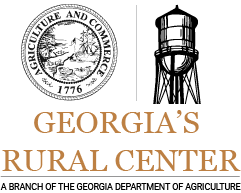Georgia Timber: A Growing Industry
- Georgia's Rural Center

- Feb 1, 2023
- 2 min read
Georgia is no stranger to the spotlight when it comes to forestry; the state consistently earns the top honors for forestry production in the country. When looking into Georgia’s forestry production, timber is number five among Georgia’s top commodities; timber production encompasses just over 80 percent of the forestry production in the state. Many timber products are essential to Georgia’s economy, including saw timber lumber, pulpwood for paper products, and veneer logs. Some innovative uses coming to the forefront of the timber industry include stronger and cheaper polymers used in 3D printing, as well as fabric materials constructed of wood fibers. Innovations like these will cause an increase in demand for timber, which leads to more trees needing to be planted to meet the demand.
This past November, Georgians had the opportunity to vote on Georgia Referendum A, the Timber Equipment Exempt from Property Tax Measure. Georgia Referendum A was approved, which means timber equipment is exempt from ad valorem property taxes as of January 1, 2023. Timber equipment will no longer be taxed based on the value of the item, however, timber is still being taxed under the measure. It is no shock that the forestry industry has been strained due to the increase in operating costs and supply chain shortages. This kind of economic pressure will be decreased to an extent because those harvesting and creating these products will be able to take the money they saved from the tax exemption and invest it back into their operation.
The timber industry is vital to rural Georgia. While we use the product to build the future every day, it also supports economic development through careers and work opportunities. There are many different types of jobs that make up the Georgia forestry industry. Currently, forestry provides about 54,000 jobs across the state. Foresters, forest and conservation technicians, forest rangers, and forest and wildlife firefighters are just a handful of some of the unique job opportunities forestry brings to the table.
Georgia’s 24 million acres make a large impact on the environment. Not only does the forest industry have a positive impact on the air we breathe, but it also helps improve Georgia’s water sources and weather. According to the Georgia Forestry Commission, trees help to trap lung-damaging particles like ash, smoke, and dust. They also help to take carbon dioxide out of the air and increase oxygen. On average, trees store about 13 pounds of carbon annually. Forestry is not only an important part of Georgia’s economy, but it helps improve Georgians' quality of life.





Working in teams always felt like a mess until I came across the Responsibility Assignment Matrix. It transformed the way our group handled assignments by defining clear responsibilities for every member. The detailed guide walked us through the steps of creating a matrix and using it to keep track of progress. Once we applied it, communication improved, and we avoided unnecessary overlap in work. Rapid Assignment Help made it easy to understand how this tool fits into academic projects. Now, project management feels organized and achievable.